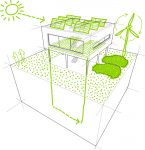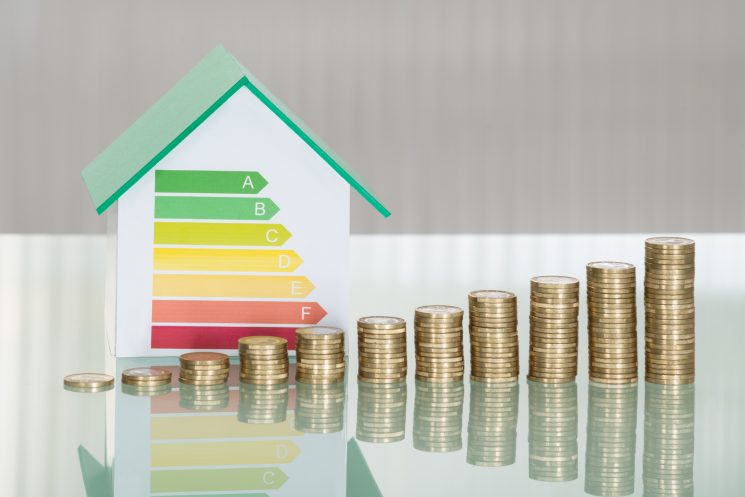Heat pumps have grown in popularity in recent years, partly as a result of government schemes to help bring the cost down for the householder and partly because of the increasing desire that people have to do their bit for climate change.
According to Google Trends, online searches for “heat pump” in the UK have increased from about 20 per month during 2017 to around three times that number in 2021. With experts calling for households on low incomes to be provided with heat pumps free of charge to stimulate market demand, we are likely to see the popularity of heat pumps continue to grow.
It is not only increasingly favourable economics that are contributing to the surging interest in heat pumps. A key driver is the fact that homeowners can typically cut their emissions in half by replacing their existing gas boiler with a heat pump system. That not only provides a cosy home, but also offers a warm fuzzy feeling from doing the right thing for the planet.
Typical Cost of a Gas Boiler
A new gas boiler might typically cost you £1,500-£3,500, including installation, although the exact cost obviously depends on a lot of factors that will be unique to your home, so an accurate cost should always be obtained from a qualified contractor.
The running costs vary with the efficiency of the boiler itself, how well insulated your home is and, of course, the cost of the gas. Typically, for an average house, you could expect to pay a little over £600 per year for heating with mains gas, rising to nearly double that should you be using LPG.
Cost of an Air Source Heat Pump
The two leading brands of air source heat pump are Daikin and Mitsubishi, which cost approximately £2,000 to £4,000 for the unit alone. This is significantly more expensive than an equivalent gas boiler already, so when installation costs are added on top of this the initial outlay is considerable. Precisely how much depends on the characteristics of your home but installation costs, like the off-the-shelf costs are likely to be significantly higher than for a gas boiler.
Installers Igloo Energy have stated that, for a typical large four- or five-bedroom property, the average cost is around £15,000 for installation.
Cost of a Ground Source Heat Pump
Ground source heat pumps are typically more efficient, thanks to the more stable temperatures below ground, which give a warmer heat source during those cold winter months. This translates to slightly lower running costs, particularly in colder climes.
However, because of the requirement to dig trenches or drill boreholes to bury the ground loop pipework underground, you could expect to pay upwards of £20,000 – £25,000 to install a ground source heat pump. There’s also going to be a fair amount of disruption while the digging goes on, not to mention that many properties might not have the space in their garden to facilitate this at all.
So, ground source is not for everyone but, as always in these matters, it is important to get good advice from a qualified professional.
Government Funding
As we’ve seen, the costs of installing a heat pump can be quite high but there are incentives that help to reduce the burden on the individual homeowner. Schemes such as the Renewable Heat Incentive are available in the UK and can knock as much as £12,000 off a £15,000 installation bill.
The Green Homes Grant promised to provide £5,000 off the cost of a new heat pump, or £10,000 if you were on a low income. The scheme is now closed but the government is committed to achieving the target of net zero by 2050, which means that alternatives to that scheme are probably under consideration right now.
Counting the carbon cost

Costs should not only be thought of in pounds and pence; we should also consider our impact on the planet through carbon emissions. Around 14% of carbon emissions in the UK arise from household heating so, if we are to have any hope of meeting the ambitious UK carbon target of net zero emissions by 2050, we need to do everything we can to reduce the use of fossil fuels for heating our homes.
If we take a look at the amount of CO2 emitted by different types of fuel, it becomes clear that burning gas, oil and other fossil fuels is not the way to go.
In terms of grammes of CO2 equivalent per kWh of heat produced, oil boilers fare the worst, emitting over 300g/kWh, with some weighing in at over 500g/kWh.
Gas boilers perform slightly better, emitting between 200 and 400g/kWh.
If you really want to make a difference, though, you should consider installing a heat pump, which emits 60-170 g/kWh for air source and 50-125 g/kWh for a ground source heat pump. The only type of heating that does better is solar thermal at 10-35 g/kWh, but many people will be sceptical about whether the cloudy UK weather can really deliver the amount of sunshine needed for these numbers to be achieved.
Summary
Given the potential financial benefits of installing a heat pump, the grants and incentive schemes from government and the green credentials of this technology, it might seem like an obvious choice.
Provided your home is suitably insulated and the installation can be done without a lot of work to modify your existing pipework and radiators, you could see a nice return on your investment.
Always seek advice from a qualified professional before having any work done on your home. This includes heat pump installation. There are a lot of factors to consider so make sure you speak to someone who knows all the ins and outs before you commit.





